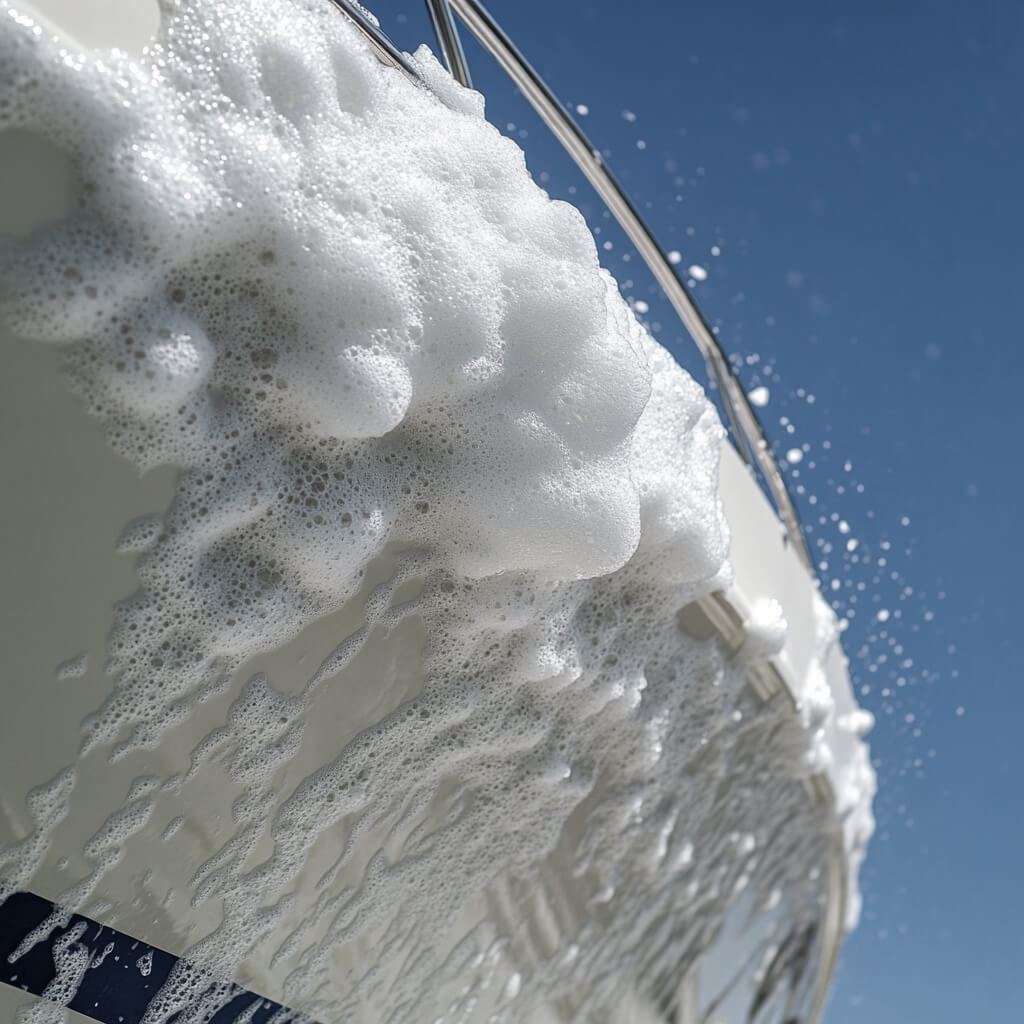If you care about keeping your boat in top condition, you already know that regular washing is essential. But what you may not know is that the type of soap you use can either protect or compromise your boat’s finish—especially if it has been waxed or ceramic-coated. Using the wrong soap at the wrong time can strip protective layers, dull your gelcoat, or dry out sensitive surfaces like marine vinyl.
So, when is it okay to break out the heavy-duty (albeit "gentle") degreasers like dish soap or Simple Green, and when should you stick with a marine-safe, pH-neutral boat soap? Let’s break it down.
What Are Degreasers—and When Can You Use Them?
Household dish soaps, all-purpose cleaners like Simple Green, and other degreasers are highly alkaline or acidic, meaning their pH levels are far from neutral. They’re engineered to break down oils, grease, and stubborn residues quickly—which is great for kitchen grime or cleaning an engine bay, but not ideal for your boat’s exterior.
Use degreasers only when:
-
You’re prepping your boat for waxing, polishing, or ceramic coating
-
You need to strip old wax or sealant
-
You’re cleaning engine compartments or bilge areas
-
There’s heavy buildup of grease, fuel, or mildew that milder soaps can’t remove
In these situations, a degreaser is a powerful tool. But once the grime is gone and the surface is prepped or protected, it’s time to switch.
Why pH-Neutral Soaps Are a Boater’s Best Friend
A pH-neutral soap (around pH 7) is formulated to gently lift dirt and salt without affecting the chemistry of your boat’s surface. This is especially important if you’ve invested in wax, ceramic coatings, or UV protectants. These protective layers are designed to shield your gelcoat and vinyl from oxidation, fading, and environmental damage—but they’re vulnerable to harsh cleaners.
Always use a pH-neutral soap when:
-
Your boat has been waxed or ceramic-coated
-
You’re doing routine washes between major detailing sessions
-
You want to preserve UV protection and water beading effects
-
You're cleaning sensitive materials like marine vinyl or isinglass
Using the wrong soap just once can degrade these protective layers. Over time, using degreasers on a protected surface is like throwing money away—and shortening the life of your boat’s shine.
⚠️ Not All Boat Soaps Are Created Equal
Just because a product says "marine" on the label doesn’t mean it’s safe for your boat’s coatings. Some so-called boat soaps still contain alkaline agents, solvents, or fragrances that can break down waxes and dry out surfaces.
When shopping for a boat soap, look for:
-
A clearly labeled pH level (around 7 is ideal)
-
No added degreasers or harsh surfactants
-
Safe for ceramic coatings and waxes
-
Biodegradable and eco-friendly (especially for water use)
Premium pH-neutral boat soaps are specifically engineered to be tough on dirt and salt, but gentle on everything else. If your boat has been coated or detailed professionally, using the right soap is the easiest way to maintain that investment.
Final Word: Choose Smart, Wash Smarter
Degreasers like dish soap and Simple Green have their place in a boater’s cleaning kit—but they should be used sparingly and only for specific jobs. For everything else, especially routine washes, a quality pH-neutral soap is the safest choice. It keeps your boat cleaner, shinier, and better protected—without shortening the life of your wax or ceramic coating.
Your boat isn’t just another vehicle—it’s an investment, a lifestyle, and often a source of pride. Treat it with the care it deserves by choosing the right cleaning products for the job.



Share:
Embracing Change: Marine Detailing, and the Divide Between Progress and Fear
Why pH-Neutral Multi-Surface Cleaners Belong in Every Boater’s Routine